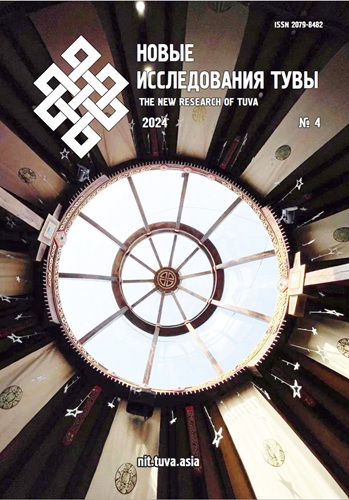The symbolic power of the Evenk language in the context of the stability of the ethnic identity of the Evenks of Yakutia
DOI:
https://doi.org/10.25178/nit.2024.4.22Keywords:
Evenki language; symbolic power; language competence; ethnolinguistic identity; language attitudes; ethnic identity; Evenki people; YakutiaAbstract
The article analyzes the symbolic power of the Evenki language within the context of the heterogeneous linguistic situation in the Republic of Sakha (Yakutia), Russia. The authors examine the resilience of Evenki ethnic identity as a potential resource for the revitalization of the Evenki language. Based on field research conducted in 2022–2023 in three Evenki settlements in Yakutia (Iengra, Tyanya, and Taymylyr) with varying degrees of language preservation, the study identifies the transformations in the role of the Evenki language within the hierarchy of ethno-defining factors among the local population.
It was found that in villages where the Evenki language maintains relatively high vitality, the language remains a key marker of ethnic identity. The study demonstrates that in communities where the language has long been lost, the consolidating role of the Evenki language has shifted towards cultural-traditional and historical-territorial aspects of identity. At the same time, an analysis of language attitudes reveals a solid foundation for the revitalization, preservation, and intergenerational transmission of the Evenki language.
The results indicate that despite the heterogeneity of the linguistic situation and varying degrees of language shift, the resilience of the ethnic identity of the Evenki people in Yakutia ensures the high symbolic power of the Evenki language, creating opportunities for its revival. This would require the implementation of a set of locally oriented institutional and sociocultural measures that account for the specific characteristics of each Evenki settlement in the republic and aim to comprehensively support the Evenki language.
References
Bitkeeva, A. N. (2022) Model of sociolinguistic forecasting and the current trends of language policy in the regions of Russia. New Research of Tuva, no. 4, pp. 38–52. (In Russ.). DOI: https://doi.org/10.25178/nit.2022.4.3
Bitkeeva, A. N., Vingender, M. and Mikhal'chenko, V. Yu. (2019) Language prognosis and language diversity in the russian federation: sociolinguistic aspect. Vestnik Volgogradskogo gosudarstvennogo universiteta. Seriia 2: Iazykoznanie, vol. 18, no. 3, pp. 6–23. DOI: https://doi.org/10.15688/jvolsu2.2019.3.1
Borgoiakova, T. G. and Pokoiakova, K. A. (2022) Semantic zones of language perception in the context of national-Russian bilingualism in Southern Siberia. New Research of Tuva, no. 4, pp. 53–64 (In Russ.). DOI: https://doi.org/10.25178/nit.2022.4.4
Varlamov, A. N. (2022) Soningi Dulin Buga: ethnogenesis and ethnic history of the Evenks. Novosibirsk, Nauka. 704 p. (In Russ.).
Danilov, I. A. (2022) The Evenki language in the village of Syuldyukar in Mirny district of the republic of Sakha (Yakutia): a reverse linguistic shift? Sociolinguistics, no. 2 (10), pp. 174–192. (In Russ.). DOI: https://doi.org/10.37892/2713-2951-2-10-174-192
Danilov, I. A., Ignat'eva, V. B. (2022) The youth of indigenous minorities in the north of the republic of Sakha (Yakutia): ethnolinguistic identity and linguistic behavior. Tomsk Journal of Linguistics and Anthropology, no. 4 (38), pp. 27–40. (In Russ.). DOI: https://doi.org/10.23951/2307-6119-2022-4-27-40
Dyrkheeva, G. A. and Tsybenova, Ch. S. (2020) Language attitudes and language loyalty of minor language speakers under the conditions of national-Russian bilingualism: the case of Buryats and Tuvans. New Research of Tuva, no. 1, pp. 62–74. (In Russ.). DOI: https://doi.org/10.25178/nit.2020.1.5
Zakharova, N. E. and Zakharova, A. E. (2022) The Content of the Concept of “Native Language” in the Linguistic Picture of the World of Modern Dolgans of the Khatango-Anabar Region (Sociopsycholinguistic Aspect). Philology: scientific researches, no. 12, pp. 46–55. (In Russ.). DOI: https://doi.org/10.7256/2454-0749.2022.12.39556
Ivanova, N. I. (2022) The essence and peculiarity of the linguistic identity of the Sakha youth in contemporary sociocultural context. New Research of Tuva, no. 4, pp. 89–105 (In Russ.). DOI: https://doi.org/10.25178/nit.2022.4.7
Ignat'eva, V. B. (1994) The national composition of the population of Yakutia (ethno-statistical study). Yakutsk, IaNTs SO RAN. 144 p. (In Russ.).
Ignat'eva, V. B., Vasil'eva, O. V., Tomska, A. G., Maklashova, E. G., Stepanova, Iu. G. and Danilov, I. A. (2022) Identity, language and culture of the youth of the indigenous peoples of the North: the results of a study in Yakutia. Novosibirsk, Nauka. 272 p. (In Russ.).
Imeeva-Kysylbaikova, M. I. and Ignatenko, L. A. (2023) The language situation in the Evenk village of Iengra: changes in the conditions of the language shift. Kazanskaia nauka, no. 11, pp. 237–239. (In Russ.).
Kazakevich, O. A., Budianskaia, E. M., Evstigneeva, A. P., Koriakov, Iu. B., Mordashova, D. D., Pokrovskaia, S. V., Polivanov, K. K., Renkovskaia, E. A., Khalilova, Z. M., Sheifer, K. O. (2022) Language vitality scales and their applicability to specific language situations. Voprosy iazykoznaniia, no. 4, pp. 7–47. (In Russ.). DOI: https://doi.org/10.31857/0373-658X.2022.4.7-47
Madiukova, S. A. and Popkov, Yu. V. (2010) Sociocultural neotraditionalism: reproduction of traditions and reproduction of ethnicity. New Research of Tuva, no. 2, pp. 25–39. (In Russ.).
Marfusalova, V. P. (2018) The Evenk language. Yakutsk, ID SVFU. 132 p. (In Russ.).
Myreeva, A. N. (1993) The linguistic situation and prospects for the development of the language of the Evenks of Yakutia. In: The small peoples of the North of Yakutia: state, problems: collection of scientific works / ed. by M. M. Khatylaev. Yakutsk, YANTS SB RAS. 98 p. Pp. 71–74. (In Russ.).
Popkov, Yu. V. and Tiugashev, E. A. (2014) Ethnosocial processes in Siberia: modern realities and topical issues of ethnonational policy. New Research of Tuva, no. 3, pp. 136–151. (In Russ.).
Sirina, A. A. (2012) Evenks and Evens in the modern world: self-awareness, environmental management, worldview. Moscow, Vostochnaia literatura. 604 p. (In Russ.).
Struchkov, K. N. (2009) The functioning of the Evenk language in the field of education of the Republic of Sakha (Yakutia): status and prospects. Novosibirsk, Nauka. 120 p. (In Russ.).
Struchkov, K. N. (2011) Sociolinguistic factors of the linguistic worldview of the Evenks in the Republic of Sakha (Yakutia). Vestnik Chitinskogo gosudarstvennogo universiteta, no. 2 (69), pp. 38–44. (In Russ.).
Struchkov, K. N. (2018) Modern communicative culture of the Evenks from Ingra village. Teoreticheskaia i prikladnaia lingvistika, vol. 4, no. 2, pp. 91–98. (In Russ.). DOI: https://doi.org/10.22250/24107190_2018_4_2_91_98
Tugolukov, V. A. (1985) Tunguses (Evenks and Evens) Central and Western Siberia. Moscow, Nauka. 284 p. (In Russ.).
Published
How to Cite
For citation:
Danilov I. A., Zakharova N. E. and Zakharova A. E. The symbolic power of the Evenk language in the context of the stability of the ethnic identity of the Evenks of Yakutia. New Research of Tuva, 2024, no. 4, pp. 348-359. DOI: https://doi.org/10.25178/nit.2024.4.22
Issue
Section

This work is licensed under a Creative Commons Attribution-NonCommercial 4.0 International License.

Author(s) license holder(s) grant rights for their work to the journal (grantee of a license) under the simple non-exclusive open license in accordance with Art. 1286.1 «Open license for a research work, work of literature or fine arts», Civil Code of the Russian Federation.
New Research of Tuva publishes articles under the Creative Commons Attribution-NonCommercial license (CC BY-NC).
Since it is an open license, author(s) reserve the right to upload the article to their institutional repository, submit it to another journal (if it allows republications), or republish it on their own website (in full, or in part).
However, several conditions apply here:
a) The republished version must always contain the name(s) and affiliation(s) of the author(s), the original title and the hyperlink to the original version on the New Research of Tuva website;
b) It must be in open access, free of charge, and no category of readers must be in any way whatsoever advantaged over general readership.
c) should the contribution be submitted elsewhere by its author(s) without substantial modification (30% or more of original text unchanged), the body of the article should contain a disclaimer that the original version was published in New Research of Tuva (with a link to the respective page)
The CC-BY-NC is a non-revocable license which applies worldwide and lasts for the duration of the work’s copyright.











